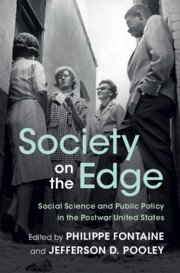'Fontaine and Pooley describe their exceptional book as a comparative history of the study of social problems in postwar America. They are too modest. They and their collaborators give us a remarkably adept study of the interconnected social sciences and how multidisciplinary work flourished and shaped today's understanding of America's difficult challenges with mental health, crime, education, poverty and so much more.'
E. Roy Weintraub - Duke University and Distinguished Fellow, History of Economic Society
'Social science was riding high in the wake of the Second World War. Here is a new history, organized around practical anxieties and ambitions rather than academic ones. Its chapters present an emerging class of social experts such as sociologists engaging with economists, psychologists, and psychiatrists, sometimes as allies and sometimes with swords drawn, defending rival visions of how to alter behaviors and make things better. The book provides a fascinating and sobering historical analysis of engaged social inquiry.'
Ted Porter - UCLA
'Neither social problems nor society itself are self-evident. They are products of framing, policy approaches, and public debates in particular historical contexts. Shaping these processes has been a major theme contribution of academic social science. Focusing on the important context of the postwar US, Society on the Edge illuminates the disciplinary and interdisciplinary histories that shaped the relationship between scientific research and public understanding of social problems.'
Craig Calhoun - Arizona State University
‘Society on the Edge will be of considerable value to a wide range of scholars. These include social scientists whose own research, teaching, and other professional activities can benefit from a deeper understanding of the longer history and recent past of social problem analysis.’
Mark Solovey
Source: HOPE
'Each chapter stands on its own, and contributing authors provide detailed examination of the thought process of social scientists and related professions at a particular time in the quest for an explanation of the source for each social problem addressed ... Each chapter contains a thorough list of references addressing a specific social issue, such that the different perspectives on a given set of social, cultural, and political events emerge in engaging detail ... Recommended.'
K. E. Murphy
Source: Choice



